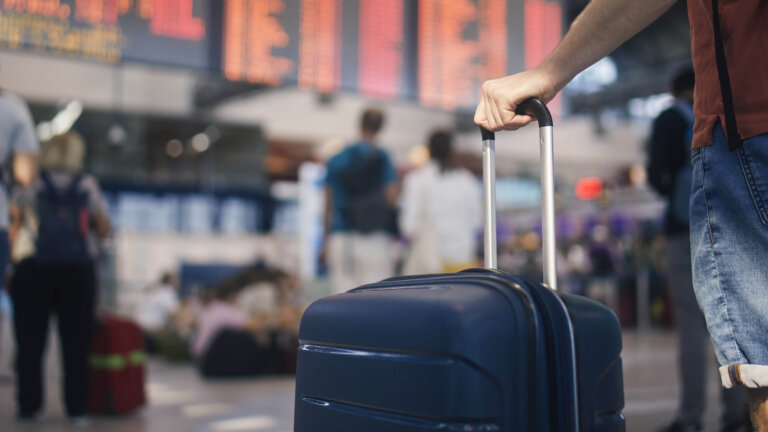Ihr Kind möchte ein Jahr oder länger im Ausland studieren? Für sie oder ihn wird ein Traum wahr. Aber Sie wissen auch, dass es viele administrative und praktische Details zu regeln gilt, von den Anmeldeunterlagen über die Versicherungsformalitäten bis hin zur Wohnungssuche. Sie wissen nicht, wo Sie anfangen sollen? Hier ist eine praktische Checkliste.

Senden Sie die Anmeldeunterlagen rechtzeitig an die ausländische Universität oder Schule
Jede Einrichtung fordert umfassende Unterlagen, um den Antrag eines ausländischen Studenten zu genehmigen. Heute werden diese Schritte komplett online durchgeführt. Wenn Sie also Ihre Short-List von Universitäten oder Schulen erstellt haben, die für Sie von Interesse sind, prüfen Sie bitte den Stichtag für die Einreichung dieser Anmeldeunterlagen (oft gegen Januar).
Was gehört in die Anmeldeunterlagen? Natürlich hängt das von der Universität ab. Sie müssen mit Sicherheit eine Auflistung des bisherigen Bildungswegs des Studenten mit den erzielten Ergebnissen vorlegen. Man könnte aber auch folgende Dinge fordern:
- Ein Motivationsschreiben;
- Ein Empfehlungsschreiben (in der Regel von einem Lehrkörper der Einrichtung, in der der Student/die Studentin derzeit immatrikuliert ist);
- Eine Liste ihrer/seiner außerschulischen Aktivitäten.
Wenn es sich um eine Wiederaufnahme des Studiums nach zwischenzeitlicher Berufstätigkeit handelt, muss eine Liste der Berufserfahrungen beigefügt werden.
Und schließlich müssen Sie, wenn Sie ein Stipendium oder eine andere Form der finanziellen Unterstützung beantragen wollen (siehe unten), die erforderlichen finanziellen Details angeben.
Die Erstellung dieser Unterlagen kann einige Zeit in Anspruch nehmen. Also ein Tipp: Beginnen Sie rechtzeitig. Dies gilt umso mehr, als die Websites, auf denen die Anmeldungen stattfinden, in den letzten Tagen vor Ablauf der Anmeldefrist tendenziell überlastet sind, da viele Studenten bis zur letzten Minute warten.
Beantragen Sie ein Stipendium oder eine andere finanzielle Unterstützung
Ein Studium im Ausland stellt eine erhebliche Investition dar. Glücklicherweise gibt es Hilfen. In Europa ist das bekannteste das Erasmus+-Programm, das die Kosten für die Immatrikulation an der Universität oder die Anmeldung an der Schule abdeckt und zu den Reise- und Aufenthaltskosten beiträgt.
Zusätzlich zu diesem Programm bieten die meisten Bildungseinrichtungen weltweit andere Formen der Unterstützung für internationale Studenten. Aber wie Sie sich vorstellen können, können sie selten allen Anträgen nachkommen. Viele weisen ihre Hilfen somit bestimmten Profilen zu, zum Beispiel auf der Grundlage der Staatsangehörigkeit, der Ausbildung oder der erzielten Noten. In den USA gibt es sogar Stipendien für Studenten, die Sport auf hohem Niveau ausüben.
Bereiten Sie diese Dokumente im Voraus vor
Die Anmeldeunterlagen wurde angenommen und Ihre Tochter oder Ihr Sohn wird seine oder ihre erträumte Erfahrung im Ausland erleben können? Herzlichen Glückwunsch!
Der andere Teil des Papierkrams beginnt jetzt: Der Teil mit den Formalitäten und Dokumenten, die vor der Abreise erledigt und ausgefüllt werden müssen.
Ausweisdokumente
Wenn der Student innerhalb der Europäischen Union bleibt, reicht ein einfacher Personalausweis aus. Wenn er die EU jedoch verlässt, muss ein Reisepass besorgt oder sogar ein Studentenvisum beantragt werden. Informieren Sie sich bei der Universität.
Nachweis der finanziellen Realisierbarkeit
Einige Länder oder Bildungseinrichtungen fordern Dokumente, die belegen, dass der Student über ausreichende finanzielle Mittel verfügt, um während seines Aufenthalts vor Ort studieren zu können.
Zahlungskarte
Natürlich benötigt Ihr Kind eine Zahlungskarte, die im Ausland funktioniert. Die Maestro-Karte funktioniert grundsätzlich in der gesamten EU. Außerhalb der EU muss häufig eine Kreditkarte vom Typ Mastercard oder Visa genutzt werden. Eine weitere Möglichkeit besteht darin, ein Bankkonto bei einer lokalen Bank zu eröffnen.
Gesundheitsdokumente
Dies sind Dokumente, die Sie im Allgemeinen für Ihr Kind aufbewahren. Aber im Ausland muss er/sie diese bei sich haben. Stellen Sie einen Ordner mit folgenden Informationen zusammen:
- Ihr/sein aktuelles Impfbuch (prüfen Sie auch, ob bestimmte Impfstoffe im Zielland empfohlen werden);
- Eine Liste ihrer/seiner Allergien;
- Ihr Kind hat eine chronische Krankheit oder eine andere Erkrankung, die eine Behandlung erfordert? Planen Sie Rezepte für zwei oder drei Monate ein, bis ein Arzt vor Ort gefunden ist. Lassen Sie eine Krankenakte auf Englisch vorbereiten, die Sie ihm vorlegen können.
Schließen Sie die notwendigen Versicherungen für einen Studentenaufenthalt im Ausland ab
Sie müssen an drei Arten von Versicherungen für Ihren Studenten denken: die Krankenversicherung, die Haftpflichtversicherung und eine Versicherung für seine Unterkunft vor Ort und seine Güter.
Krankenversicherung
Die meisten Schuleinrichtungen im Ausland verlangen gültige Krankenversicherungsbescheinigungen für die gesamte Dauer des Aufenthalts. Wenn Ihr Student in ein EU-Land reist, gilt die medizinische Versicherungsdeckung, die ihn in Luxemburg schützt. Es genügt, eine europäische Krankenversicherungskarte beim Centre Commun de Sécurité Sociale (CCSS) zu beantragen. Diese kostenlose Karte schützt sie/ihn auch in Island, Liechtenstein, Norwegen, der Schweiz und dem Vereinigten Königreich.
Achtung: Die Basis-Krankenversicherung deckt nicht alle Krankenhauskosten ab, und wenn Ihr Kind zurückgeführt werden muss, erfolgt dies auf Ihre Kosten. Um einen besseren Versicherungsschutz zu haben, können Sie eine Versicherung für Krankenhausaufenthalte abschließen.
Die Reiseversicherung hat auch einen Gesundheitsbaustein, deckt aber nur die medizinischen Kosten vor Ort für Aufenthalte unter drei Monaten ab. Sie ist jedoch unerlässlich, wenn der Student in ein Land außerhalb der EU geht.
Haftpflichtversicherung
Die gute Nachricht: Die Familienhaftpflichtversicherung, die auch Ihre Kinder abdeckt, gilt in jedem Land innerhalb der EU. Wenn sie also Material, das ihnen von der Universität oder der Schule anvertraut wird, beschädigen oder versehentlich Schäden in ihrer Studentenwohnung verursachen, kommt Ihre Haftpflichtversicherung zum Tragen.
Und was ist, wenn dem Studenten sein eigener PC gestohlen wird? Um sich zu schützen, können Sie seine IT-Hardware versichern lassen. Das ist umso nützlicher, wenn er/sie für ihr/sein Studium sehr teure Ausrüstung benötigt.
Elektronische Sachversicherung
Ein Student ist nie ohne
sein Smartphone, seinen Laptop und seine Kopfhörer unterwegs. Diese bereits im
Alltag stark beanspruchten Gegenstände können unterwegs noch leichter Schaden
nehmen. Und Sie haben sicherlich keine Lust, sie zweimal im Jahr zu ersetzen.
Sie haben zwei Möglichkeiten:
- Die im Angebot mozaik enthaltene Versicherungsleistung „Mobile Güter“ deckt alle elektronischen Mobilgeräte ab (Smartphone, Konsole, Fotoapparat, Laptop usw.).
- Die Versicherungsleistung „Technologische Güter“, eine weitere Option bei mozaik, versichert das nicht tragbare elektronische Material (Computer, Drucker, Fernseher usw.)
Folgende Dokumente sollte man bei der Abreise bei sich haben
Der Tag X kommt näher? Wenn Sie alle oben genannten Schritte unternommen haben, können Sie ihm im Prinzip gelassen entgegenblicken.
Wenn der Studentenaufenthalt in der EU stattfindet, werden die Ankunftsformalitäten nicht allzu kompliziert sein. Wenn Ihr Student jedoch in ein Nicht-EU-Land reist, besteht die Gefahr, dass der Zoll von ihm weitere Angaben verlangt. Stellen Sie sicher, dass Ihr Sohn oder Ihre Tochter neben dem Reisepass und den Dokumenten im Zusammenhang mit dem Studentenvisum folgende Dokumente in der Tasche hat:
- Die schriftliche Zusage über die Aufnahme an der Universität oder Schule.
- Ihre/Seine lokale Adresse, wenn sie/er bereits eine hat (andernfalls geben Sie an, wo sie/er sich vorübergehend aufhalten wird, bevor sie/er eine Wohnung gefunden hat).
Auslandsstudium: Wie können Sie sicher sein, dass Sie nichts vergessen haben?
Seien Sie beruhigt: Jedes Jahr machen zehntausende Studenten Auslandsaufenthalte. Die Hochschuleinrichtungen haben also Erfahrung damit. Sie haben immer einen speziellen Service für ausländische Studenten, der Ihre Fragen beantworten kann.
Bei Foyer verstehen wir die spezifischen Versicherungsbedürfnisse Ihres Studenten perfekt. Mit unserer mozaïk-Versicherung können Sie insbesondere viele Erweiterungen hinzufügen, um Risiken abzudecken, die Sie für notwendig erachten.


